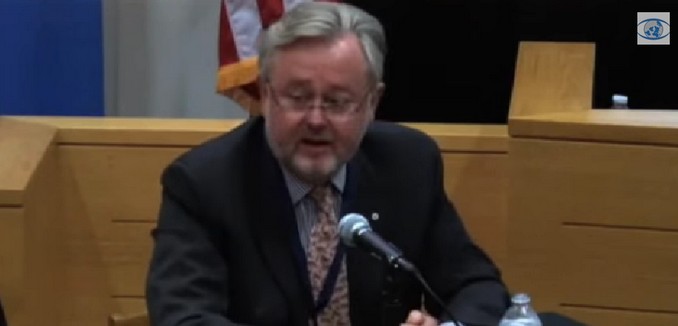UN Watch reported Friday that William Schabas, recently appointed head of a United Nations Human Rights Council (UNHRC) commission to investigate Israel, once attempted to disqualify three judges who convicted him with “violating human rights and freedom” by accusing them of bias.
In 1974, when Schabas was a Ph.D. student in history at the University of Toronto, and a leader in the radical SDS group, he was charged and convicted with violating human rights and freedoms by physically obstructing a visiting lecturer from speaking on campus.
Schabas was found guilty on four charges and suspended from the university for four years, later reduced to two.
It is a curious bit of history that, according to a decision of the Ontario Divisional Court (Re Schabas et al. and Caput of the University of Toronto et al.), Schabas tried to disqualify the entire panel hearing his case by arguing that they were biased.
Schabas has previously expressed his desire to have Prime Minister Benjamin Netanyahu tried as a war criminal, refused to call Hamas a terrorist organization, and prejudged Israel’s guilt on war crimes charges. However, he recently insisted that he doesn’t “hate Israel,” and “would put [his] opinions aside” and judge Israel’s actions fairly.
In Everything You Need to Know About International Law and the Gaza War, which appeared in the September 2014 issue of The Tower Magazine, David Avraham Daoud explained why appointing Schabas undermines, not strengthens, international law.
But justice doesn’t need “twisting” and “maneuvering.” A jurist’s personal biases should play no part in a legal determination. The very idea of double standards in law is repugnant, oxymoronic and self-defeating. Law must be objective and blind. It cannot serve political ends, no matter how noble, and definitely not political power interests. In determining guilt and innocence, it cannot allow for the subjectivity exhibited by Schabas. Otherwise, countries that abide by international humanitarian law will be increasingly limited from defending their civilians against unscrupulous actors that ignore and exploit the laws of war. These actors will, in turn, be encouraged to commit further atrocities shielded in the knowledge that “power interests” will protect them from accountability. Legal military actions will be labeled “war crimes” because “political balances” demand it.
[Photo: unwatch / YouTube ]




